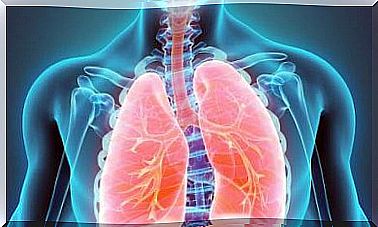8 Consequences Of Bulimia: Physical And Psychological
Bulimia involves certain behaviors that threaten the physical and psychological health of the person presenting it. Detecting such behaviors is essential to avoid the consequences of this eating disorder.

The consequences of bulimia on physical and psychological health can be fatal. Although its effects on the body are known more precisely than a few years ago, it is still one of the most common eating disorders, especially among young people.
There are various factors that trigger its development. However, one of the most important addresses the need to achieve ‘perfect’ bodies without a gram of fat. This concern is often associated with certain characteristics of the individual’s personality, as well as with different variables on an emotional level.
With regard to its diagnosis, it is essential to know its most relevant symptoms and some of the consequences it causes. We will tell you below.
What is bulimia?
Bulimia is an eating disorder characterized by an uncontrollable urge to overeat and later purge the body through inappropriate methods.
A person with this problem knows that binge eating is unhealthy and feels guilty about it. Therefore, with the idea of losing weight or avoiding weight gain, he resorts to methods to eliminate that excess of calories, such as inducing vomiting, doing intense physical exercise or abusing diuretics and laxatives.
The key aspect to address in such circumstances is above all self-perception, since these patients constantly worry about their weight and body shape, judging themselves harshly for what they consider a defect.
Risk factor’s
There are several conditions that are related to the development of this disorder, some of them being the following:
- Being overweight or obese.
- Genetic or family predisposition.
- Psychological and emotional problems.
- Social and media pressure.
- Requirement to maintain a certain weight for a sports or artistic practice.
Symptoms of bulimia

People with bulimia try to go unnoticed, since they are aware of their actions and prefer to hide them. They often make excuses to leave the table and carry out their purging method, deliberately causing themselves to vomit.
All in all, some of the main symptoms involve:
- Make an inappropriate use of laxatives or diuretics.
- Extreme concern for body shape and weight.
- Inability to control eating behavior.
- Overeating to the point of discomfort.
- Induce vomiting or exercising excessively after a binge.
- Restrict calories or eliminate food groups between binges.
- Take dietary supplements or weight loss products.
Consequences of bulimia on physical and psychological health
It is common for the family of the patient with bulimia to find it difficult to identify the behaviors of the disorder. Moreover, the diagnosis is usually given when the problem has already caused several physical and psychological sequelae. We present some of the most common.
1. Digestive disorders
Among the first consequences of bulimia are those that directly affect the digestive system. Swallowing difficulties, reflux, and ulcers often occur in the esophagus. These last injuries are due to the return of stomach acids that causes vomiting.
Such complications have been pointed out in a current work by professors Philip S. Mehler and Melanie Rylander Tales (University of Colorado Health Sciences Center, United States).

2. Respiratory problems: another of the consequences of bulimia
As the publication just cited also points out, damage to the esophagus from ongoing vomiting can cause chronic hoarseness.
Also, patients have a weaker immune system and may suffer severe lung infections from breathing in food when vomiting.
3. Cardiovascular problems
When using purging procedures, such as the use of laxatives or diuretics, the bulimic person is likely to experience dehydration. This imbalance in electrolyte levels is related to cardiovascular disorders in these patients.
In this sense, a recent review led by a group of researchers from the University of Florida indicates that among these conditions damage to the heart muscles, tachycardias (accelerated heart rate) or hypotension (low blood pressure) occur.
4. Musculoskeletal weakness
In turn, the previous article identifies the effects that the abuse of laxatives and diuretics unleash on the musculoskeletal system. The use of these products leads to dehydration and the loss of significant amounts of potassium, which influences the state of the muscles and bones.
5. Dental pathologies
Self-induced vomiting is also associated with dental ailments, with frequent e enamel erosion, tooth and gum sensitivity, cavities and gingival recession (the gums retract, exposing previously plugged parts of the tooth).
Such ailments, as well as the reluctance to go to the dentist these are conditions that are reflected in a survey conducted by Dr. Jenny H. Conviser and her team.
What these authors find is that, due to the verg shame and fear they feel, those with this disorder avoid visits to the dentist . However, this lack of communication only makes the symptoms worse and delays the start of treatment.
6. Distorted body image
This aspect is both a symptom and a consequence of bulimia, since the distortion of the image of the body itself increases as the problem progresses. That is, although the thinness of these people is evident to the eyes of others, they continue to see themselves as overweight when they look in the mirror.
As we mentioned at the beginning, this is surely one of the issues that requires the most attention when starting therapy. To the extent that work is done on improving the perception that the patient has of himself, he will be able to introduce changes in other areas of his life.
7. Depression is also one of the consequences of bulimia
Another of the consequences of bulimia at a psychological level is the deterioration in the mood that the affected person experiences.
Due to feelings of guilt and obsession with weight, patients are often mired in deep sadness, which sometimes comes to harbor suicidal thoughts.

8. Social isolation
According to a review led by the Department of Psychology of the University of São Paulo, distancing in interpersonal relationships is also one of the common consequences of bulimia.
With the intention of avoiding the problem, the patient prefers to remain alone and stop exposing himself to social encounters. The patient does not want to hear opinions of his body, nor does he want others to know about the behaviors he is carrying out.
However, this isolation does nothing more than deprive the person of the support that they could receive from family and friends, which contributes both to the worsening of their emotional state and to the maintenance of purging behaviors.
Reflections on these consequences of bulimia
However, bulimia appears as a serious disorder that causes significant damage to the body and mental health of those who suffer from it.
Faced with such conditions, early diagnosis is, therefore, an unavoidable tool. For this, it is vitally important to know both the symptoms and the consequences that occur in these situations.
Although the treatment is different in each case, professional help and family support will be determining factors in addressing the difficulties.









